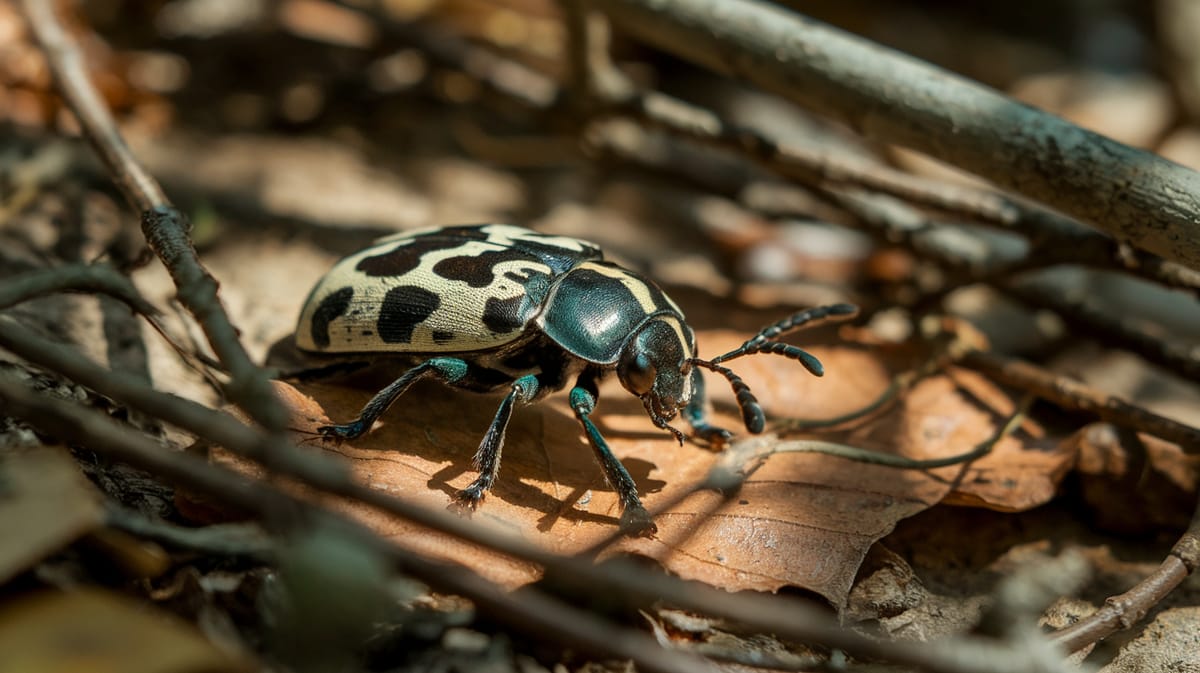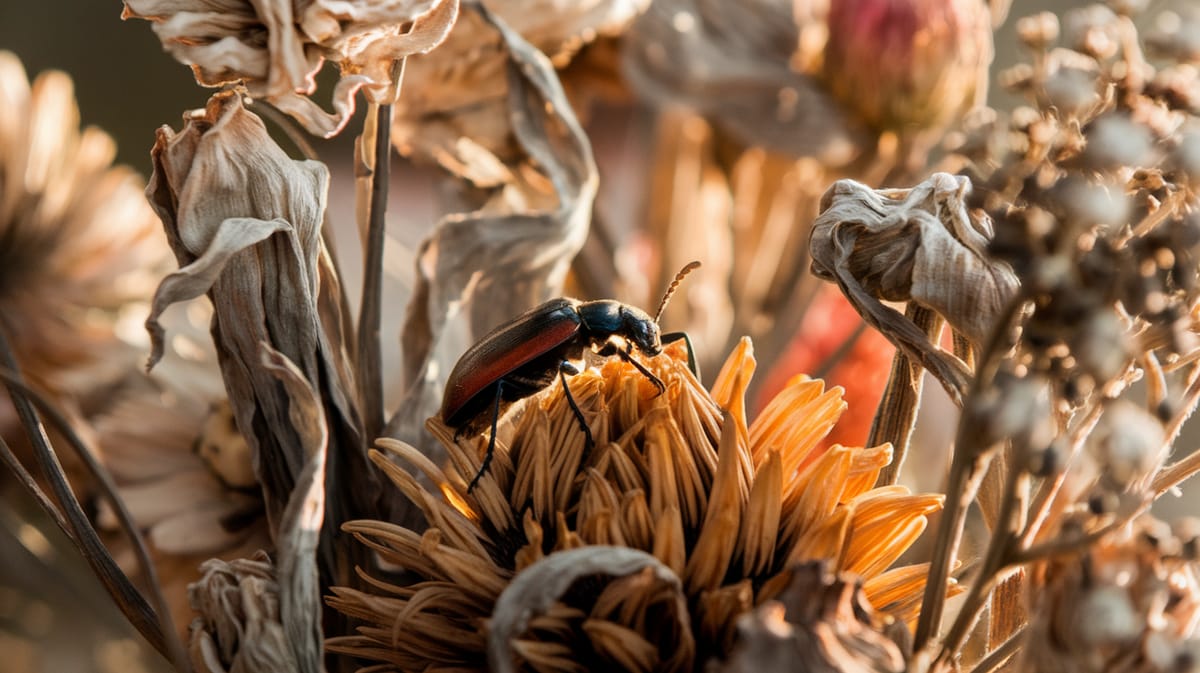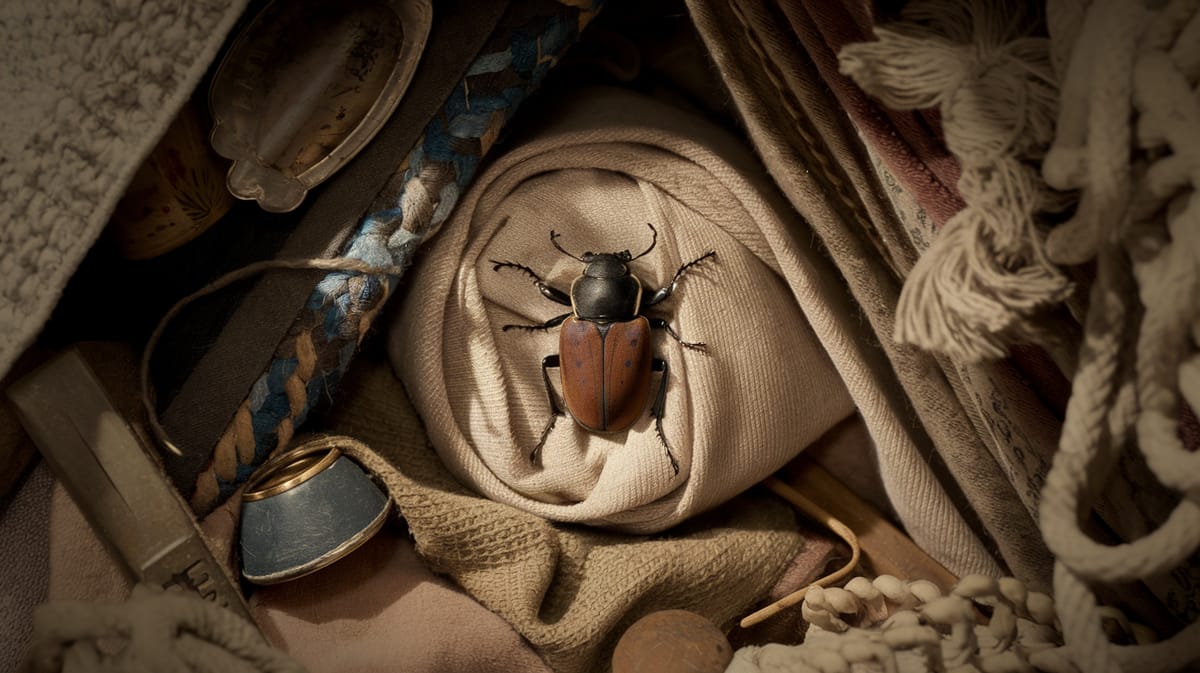Carpet Beetle
Voracious scavenger of natural fibers, the Carpet Beetle plays a critical role in recycling organic materials. Its larvae are infamous for feasting on wool, silk, and feathers.

Key Insights at a Glance
Did You Know?
Taxonomy & Classification
Carpet beetles are adept at surviving in diverse environments, with specialized mouthparts for feeding on organic materials, highlighting their role as efficient decomposers. Let's understand the evolutionary journey and classification of these remarkable decomposers.
Species Diversity
Carpet beetles encompass over 200 species globally, thriving in various habitats and adapting to different food sources.
Evolutionary Resilience
Originating over 100 million years ago, carpet beetles have adapted through major climate shifts, showcasing their remarkable survival capabilities.
Lifecycle and Growth
A remarkable journey of transformation from Egg to Adult.
Egg
Female carpet beetles lay eggs in hidden areas, ensuring optimal conditions for larval development once hatched.
Larva
Larvae feed on natural fibers, causing damage as they grow through multiple molts, preparing for pupation.
Pupa
During pupation, larvae undergo transformation, developing into adult beetles within a protective cocoon.
Adult
Adult beetles focus on reproduction and dispersal, often found near windows searching for light.
Dietary Habits
A resourceful scavenger, this insect thrives on natural fibers, adapting to varied environments for optimal survival and reproduction.
| DIET TYPE | DESCRIPTION |
|---|---|
| Primary Diet | Primarily feeds on wool, silk, and other animal-based materials found in homes and museums. |
| Secondary Diet | Occasionally consumes stored grains, spices, and pet foods, particularly when animal fibers are scarce. |
| Occasional | Rarely feeds on synthetic fibers, only ingesting them if mixed with their preferred natural materials. |

Behaviour and Adaptations
Discover the fascinating adaptations that enable the Carpet Beetle to thrive in various environments.
Resilient Larvae
Carpet beetle larvae can survive in low-nutrient environments, feeding on natural fibers.
Protective Coloration
Their mottled coloration helps them blend into surroundings, avoiding predators.
Dormant Survival
They can remain dormant for long periods, conserving energy until conditions improve.
Ecosystem Impact
Carpet Beetles play a crucial role in ecological balance through decomposition and food chain integration.
Decomposition Experts
Break down organic matter, recycling nutrients back into the ecosystem.
Food Source for Predators
Serve as a vital food source for birds and other small animals.
Ecosystem Cleaners
Help clean up dead insects and animal remains.
Conservation Challenges
Understanding and addressing the major threats to Carpet Beetle populations.
Chemical Exposure
Pesticides disrupt beetle life cycles, leading to population declines.
Habitat Loss
Urbanization reduces available habitats, affecting beetle survival.
Climate Change
Altered climates affect beetle development and distribution.
Frequently Asked Questions
How long do Carpet Beetle live?
Carpet beetles typically live for about one year. Their life cycle includes four stages: egg, larva, pupa, and adult. The larval stage can last from several months to a year, depending on environmental conditions, while adults live for a few weeks.
What do Carpet Beetle eat?
Carpet beetles primarily feed on natural fibers such as wool, silk, leather, and fur. They also consume lint, pet hair, and dead insects. The larvae are the most destructive stage, causing damage to household items made from these materials.
Are Carpet Beetle poisonous?
Carpet beetles are not poisonous to humans or pets. They do not carry diseases or pose direct health risks. However, their larvae can cause skin irritation or allergic reactions in some individuals due to the tiny hairs on their bodies.
Are Carpet Beetle endangered?
Carpet beetles are not considered endangered. They are common pests found worldwide, thriving in various environments. Their ability to adapt to different conditions and feed on a wide range of materials contributes to their stable population.
What do Carpet Beetle symbolize?
Carpet beetles do not have specific symbolic meanings in culture or folklore. They are generally seen as pests due to their tendency to damage household items. Symbolism, if any, may vary depending on cultural interpretations and individual beliefs.
Do Carpet Beetle bite?
Carpet beetles do not bite humans. They are not aggressive and do not have the mouthparts necessary to bite. The larvae may cause skin irritation or rashes in some people due to contact with their tiny hairs.
What color are Carpet Beetle?
Carpet beetles are typically black with patterns of white, yellow, or orange scales on their backs. The varied carpet beetle, for example, has a mottled appearance with a mix of these colors, making them distinct among different species.
Does a Carpet Beetle have wings?
Yes, adult carpet beetles have wings. They are capable of flying and often enter homes through open windows or doors. While the larvae are wingless and crawl, adults use their wings to search for food and mates.
What does a Carpet Beetle look like?
Carpet beetles are small, oval-shaped insects, usually measuring 2 to 4 millimeters in length. They have a hard, rounded body with patterns of white, yellow, or orange scales on their back, giving them a speckled appearance.
Is a Carpet Beetle an insect?
Yes, a carpet beetle is an insect. It belongs to the family Dermestidae within the order Coleoptera, which encompasses beetles. Like all insects, carpet beetles have six legs, a segmented body, and undergo a complete metamorphosis during their life cycle.
Related Insects
Discover insects with similar characteristics to Carpet Beetle - including shared habitats, diets, and taxonomic classifications
Share this profile
Help others discover Carpet Beetle
